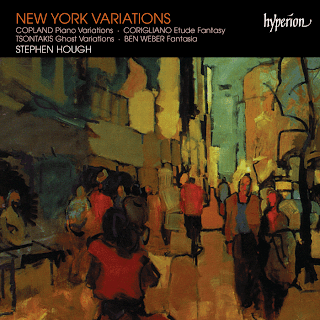A personal diary that keeps track of my listening fodder, with mixed observations on classical music and a sprinkle of jazz and pop.
zondag 10 juni 2012
Tsontakis: Ghost Variations - Weber: Fantasia - Copland: Piano Variations - Corigliano: Etude Fantasy
This CD I picked up from the constantly updated 'Please, someone, buy me' batch that Hyperion Records offers at deep discounts (at this very moment it is still available but it won't be for long). It's the kind of piano recital that inevitably tickles my curiosity: not so well known American 21st century works intelligently curated under a banner that promises urbaneness and metropolitan sophistication. Yesterday I played it through for the first time and I was not displeased with what I heard: a rather accessible (but not trivial) Etude Fantasy by Corigliano, Copland's famous and rather stern Piano Variations, a short Fantasia (Variations) (1946) by Ben Weber and, as pièce de résistance, a big and wayward work - Ghost Variations - by George Tsontakis (b1951). It was this last piece that intrigued me most, so I listened to it a couple of more times. It's a very substantial work, stretching over 30 minutes, that falls into 3 parts: a fantasia-like head movement culminating in a madcap set of Mozart Variations, followed by two scherzi. I don't think I have seen a piece in this kind of idiosyncratic layout before. From Tsontakis' wikipedia page I learned that Stephen Hough's premiere performance on this CD was nominated for a Grammy Award for Best Contemporary Classical Composition and that it was the only classical recording among Time magazine's 1998 Top Ten Recordings. I'd need to spend a bit more time with this piece to get a better grip on it. For now I'd say that this reminds me of late Beethoven with a postmodernist twist. The writing is really resourceful and exhibits formidable drive. It's basically tonal so that's not where the difficulty is. It's the overall shape of the piece that eludes easy comprehension. Hough writes in the booklet notes that "there are two overriding, opposing psychological elements at work in the piece that could be described as obsessiveness versus dissipation, clear-sightedness versus hallucination, firm purpose versus aimlessness: a contrast between moments when everything matters, and moments when nothing matters (...). The search for enlightenment happens here either by obsessive repetition - as if trying to solve a problem by going over it again and again; or by an unravelling process, 'becoming muddled' or 'doodling' as the composer writes in the score." The first movement sounds like a tormented, disjointed fantasia in which a dark, chorale-like theme (reminding me of Liszt) plays a prominent role. But there are also many twists I would associate with ageing Beethoven. This leads up unexpectedly to a set of tongue-in-cheeck variations on a theme from Mozart's E flat major piano concerto, KV482. Astonishingly, the whole thing seems to work. The two scherzi - each around 9 minutes long - are complex compositions in their own right which fully demand the listener's attention. The piece ends in a wonderfully atmospheric way with a final variation on the Mozart theme played on the wood of the piano frame. I'm certainly going to spend more time with this work in the next couple of weeks. Kudos to Hyperion and Hough for the imaginative programming, the persuasive performances, the excellent recorded sound, beautiful packaging (with a suggestive painting by Ben Moore gracing the cover) and very informative notes by the performer himself. A great find!
Abonneren op:
Reacties posten (Atom)

Geen opmerkingen:
Een reactie posten